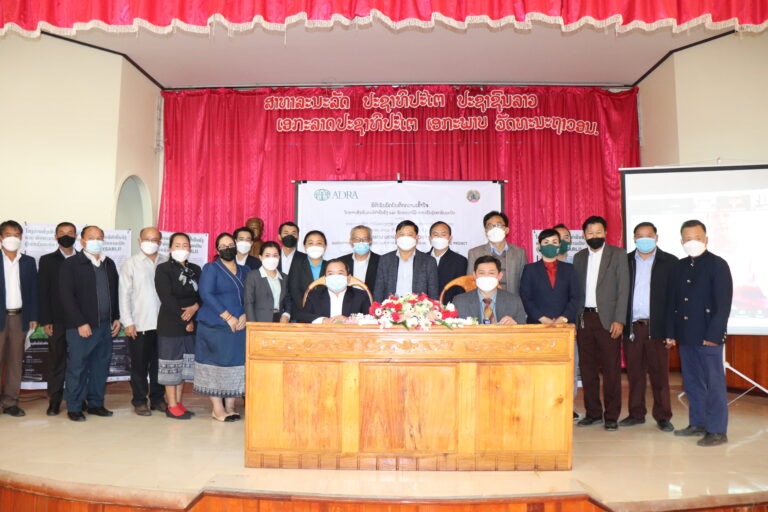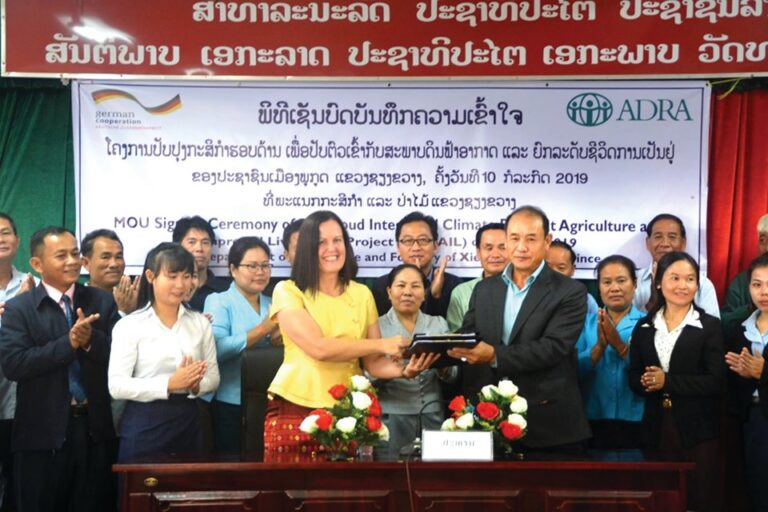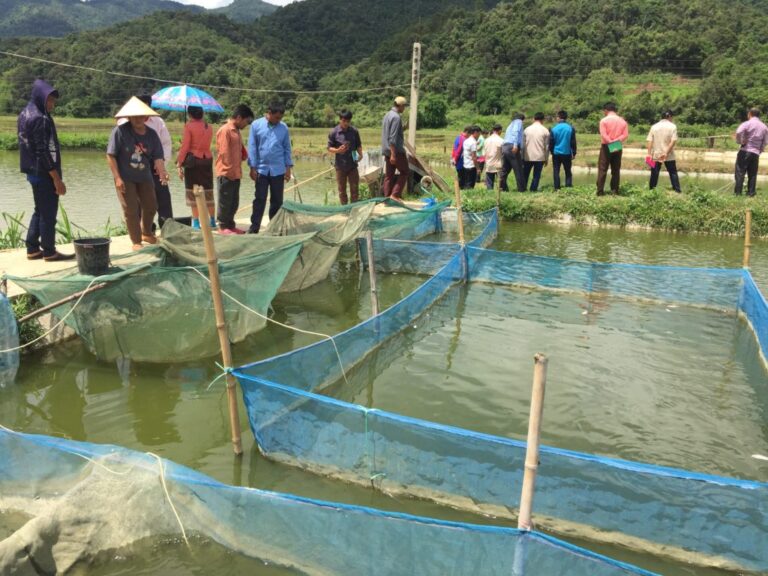Agriculture
Planting Seeds for the Future
More than 1 billion people in the world live on less than a dollar a day and 800 million people need long-term food solutions. The cycle of poverty is strong and many regions in the world will reach the brink of a hunger crisis unless they are given the tools to provide for themselves.
ADRA Laos is fighting hunger through our food security programming which includes agriculture, livestock, natural resource management, and livelihood interventions. Partnering with local Civil Society Organisations and Government Departments, our programming promotes approaches in Good Agriculture Practices, Permaculture principles, and Climate Smart Agriculture, integrated livestock management, natural resources and fisheries management and conservation, and economic development through increasing crop yield, improving value chains, and market linkages.
ADRA applies a social inclusion approach and works at the micro level with farmers, farmer organisations and communities to the meso and macro level with district, provincial and national partners and key stakeholders.
CURRENT PROJECTS
PICRAIL
SARLI
CLOSED PROJECTS
PARTNERS: AusAID, ADRA Australia, Xiengkhuang Provincial Agriculture and Forestry Department, Xiengkhuang Provincial Health Office, Mok Mai District Agriculture and Forestry Department, Mok Mai District Health Office
LOCATION: Mok Mai District, Xiengkhuang Province
IMPACT AREAS: Hunger and Nutrition, Community Health, Water, Sanitation and Hygiene, Animals and Agriculture, Economic Opportunity
The Mok Mai Integrated Development Initiative (MMIDI) was implemented in Lao and Hmong villages in Mok Mai District, Xiengkhuang Province from 2010-2016.
The project goal was to increase resilience and decrease vulnerability to poverty in target rural communities through a comprehensive integrated approach to ground level community development.
In an effort to provide a holistic and sustainable program, MMIDI led a community demand-driven intervention model that enabled the project to tailor activities to the exact needs of each community. The main principle of this programmatic strategy is to place the community first and respond to their needs rather than delivering a ‘cookie-cutter’ pre-determined model. The benefits of this strategy are a high sense of ownership of the process and outcome, empowerment through having a genuine choice and ability to prioritise the assistance that is provided to them and an increase in the sustainability of benefits gained.
The primary sectors were: Primary Health Care (WASH, MCH, Basic Health) and Enhanced Food Security and Management of Natural Resources (Agriculture, animal raising, livelihoods and economic empowerment and NRM of forests and fisheries).
1. Primary Health Care
The Primary Health model implemented is in line with the Lao Ministry of Health Policy on Primary Health Care which identifies water, environment, sanitation, education, communication and health system strengthening as priorities. The project primarily focused on WASH activities however it will also contribute towards supporting the broader primary health needs of the target beneficiaries as it is increasingly being recognised that WASH activities need to be encased in a broader Primary Health Care model in order to be have a positive impact on the health of communities.
WASH – Improved access to water in combination with an intensive health education and promotion campaign prepared families to take action on sanitation matters. Without intensive regular health promotion and follow up, ADRA’s experience is that people will not make the change from open defecation to the use of household sanitary facilities. Once there was sufficient awareness for families to start getting ready to break the faecal–oral cycle of disease, the project used participatory techniques to facilitate each interested family to build a latrine according to their resource base and personal preferences.
The district government’s target was to increase clean water supply to 67% during the project timeframe which required at least 5 Subsidised Community Gravity Flow water-supply Systems (GFS) to be built in the target area. The project facilitated the construction however of 10 GFS units taking water from nearby mountain springs or streams to the communities. Village Water Committees were established and equipped to organise the community operation and maintenance (O&M) of the GFS and monthly water fees are still being collected to ensure economic sustainability. Water treatment (filtration, boiling) awareness was also undertaken during community dialogue and feasibility analysis.
Community promotion and participation activities regarding the prevention and control of health problems also brought about positive behaviour change. The sessions were conducted along with community mobile clinic days. The health behaviours targeted included hand washing at critical times (before food preparation/eating/after using latrine), village cleanliness, use of improved latrine facilities, treatment and storage of drinking water. Children are the most vulnerable to disease but also the most likely to adopt new hygienic behaviour patterns. Therefore, the project focused on health behaviours of children and their caretakers.
2. Enhanced Food Security and Management of Natural Resources
This component enabled target communities to adopt sustainable land-use and farming systems; ensuring sustainable local food security and income generation. It also provided diversified agricultural training techniques to help improve knowledge and abilities in cropping, livestock and Non-Timber Forest Products (NTFPs) for local farmers.
This aspect of the project focused on diversified agricultural production, utilization, and market development principles based on the belief that rural diversification is a process aimed at reducing the risk and vulnerabilities faced by poor rural households. These risks and vulnerabilities were heightened as most of the households were exposed to seasonal and environmental risks because of their reliance on one or two means of food security through shifting cultivation. The project mitigated these risks by thoroughly analysing the local communities to determine what kinds of agriculture systems are suitable in the local context.
Training was provided for the establishment of Farmer Group Enterprises (FGEs) to help aid in the development and sustainability of local markets which helped local value adding processes within the local target villages. Ultimately, through greater collaboration between farmers and producers, the FGEs empowered local producers to not only improve their livelihoods, but to improve the overall agricultural landscape within their communities.

The overall concept of food security and natural resource management thus focused on expanding beyond just reliance on rice and corn, to include production, access to and consumption of a wider range of nutritional food items. The model of offering alternative solutions to shifting cultivation within their village reduced the pressure on an already severely degrading sloping land. MMIDI focused on enhancing the human and physical assets, mainly an increased and diversified consumption pattern, and increased incomes (where available). Animal raising was also requested by the community and cows and small livestock were included.

MMIDI also assisted some communities to graduate as a Model Healthy Village under the Government of Lao’s certification.
In 2015-2016 ADRA collaborated with a group of Australian volunteers who fundraised and contributed 103 million kip towards the mother and children’s extension of a birthing suite and maternity ward for the Mok Mai District Hospital.


PARTNERS: ADRA Australia, ADRA Laos & ADRA Vietnam, Xiengkhuang Provincial Agriculture and Forestry Department Lao PDR, Can Tho District Vietnam
LOCATION: Xiengkhuang Province
IMPACT AREAS: Advocacy, Social Justice, Animals and Agriculture
The South East Asia: Regional Environmental Adaptation to Climate Change Training and Implementation (SEA: REACTi) Project was implemented in Lao and Vietnam during 2013.
Context: South East Asia is annually affected by extreme climates; particularly floods, droughts and tropical cyclones, while large areas of the region are prone to flooding or severely affected by monsoons. According to the Intergovernmental Panel on Climate Change’s (IPCC) fourth assessment report, South East Asia was expected to be seriously affected by the adverse impacts of climate change since most economies rely on agriculture, natural resource management and land management. These climatic impacts have the potential to threaten the livelihoods of the rural poor, who live in areas with limited adaptive capacity.
Rural farmers are finding it increasingly difficult to manage their yearly production quotas as adverse and unpredictable weather conditions are making it increasingly difficult to plan and implement their annual plans. Rather than being proactive, climate change is forcing rural farmers to be reactive to the circumstances, which makes it increasingly difficult for rural farmers to adapt to the changing climate.
The overarching goal of the South East Asian South East Asia: Regional Environmental Adaptation to Climate Change Training and Implementation (SEA: REACTi) Project will be to open up a dialogue between inter-sectoral partners within the ASEAN community and to design an effective community based climate change adaptation model, with a specific focus of scaling it up and integrating it at the conclusion of the project.
A particular focus was placed upon governmental partners within the 2 countries of Lao and Vietnam. These governmental partners were tasked with developing 2 pilot projects in partnership with ADRA to be implemented in their respective countries based upon the needs and desires of the local community members. Finally, a project dissemination workshop was held at the conclusion of the 12-month project so that project participants could share experiences and lessons learned. Specific focus was placed upon strategies and plans to scale up the pilot projects, including methods and ways to integrate the adaptation learning and experiences into existing ADRA Australia projects that were currently operating in Lao and Vietnam.







